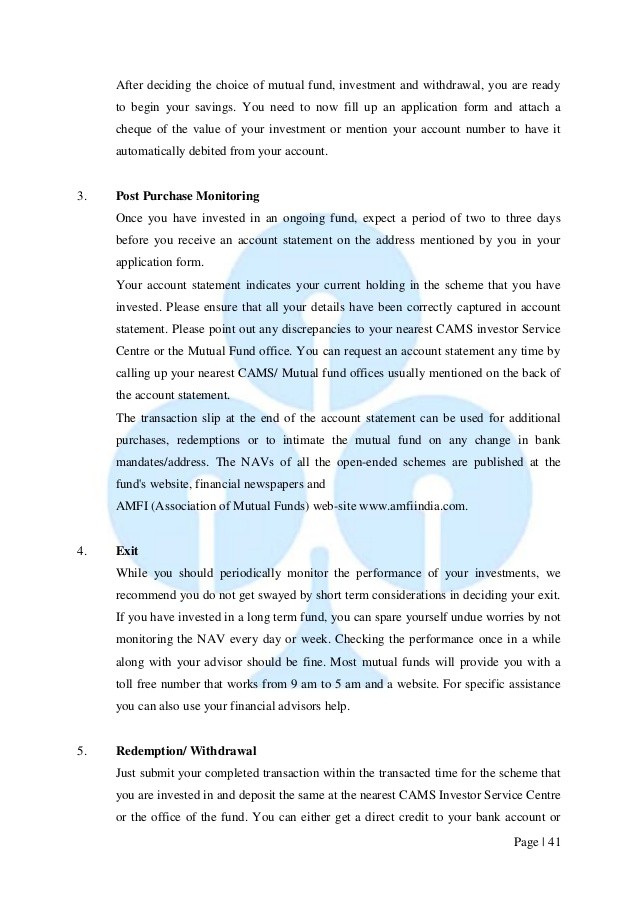Is Your Mutual Fund s Board Watching Out for You
Post on: 10 Июнь, 2015 No Comment

ENLARGE
Tim Foley
Apart from the obvious turmoil of the times, however, there were an array of hidden reasons for the fund’s sudden fall. In public disclosures, YieldPlus’s managers said the fund concentrated on safe short-duration bonds. But according to the Securities and Exchange Commission, the fund loaded up on longer-term debt—which it was forced to unload at fire-sale prices during the crash. The fund’s registration statement said managers wouldn’t place more than 25% of assets in certain types of securities; but not long before the market’s free-fall, managers stuffed about 50% of its portfolio with nongovernment mortgage bonds.
In the end, Schwab, without admitting or denying wrongdoing, agreed to pay $119 million to settle SEC civil charges that it misled investors; the company also paid $235 million to settle a private lawsuit.
Schwab, saying it was constrained by settlement terms, declined to comment on the cases. Last year, it attributed the fund’s losses to an unforeseeable credit crisis.
While the incident involved just one fund, it shines a rare spotlight on something that could affect any investor in the $12 trillion fund industry: the failure of an important if little-known layer of investor protection—the fund’s highly paid internal trustees. The lapses in oversight that occurred with YieldPlus, experts say, are part of a system of governance that is almost designed to fail.
The real puzzle isn’t why these safeguards don’t work, says John Morley, a University of Virginia Law School professor who has studied the issue extensively. It’s why anybody thinks they could work.
Every mutual fund has a built-in mechanism to shield shareholders from management disasters: a board of directors or trustees.
The boards have a clear mandate under federal securities law to monitor potential conflicts of interest, review and approve key fund documents and ensure that advisers provide satisfactory returns with reasonable fees. In theory, fund directors fulfill the same general role as directors of public companies, with broad powers to safeguard shareholder interests—including, if necessary, firing the advisory firm running the fund.
But an investigation by SmartMoney shows this layer of protection may be among investors’ most porous. Mutual-fund boards typically don’t hold annual shareholder meetings. It’s almost unheard-of for a fund’s investors to remove a director or change a management fee. When an advisory firm opens a new fund, it handpicks the fund’s directors—who, in theory, can vote themselves onto the board for life.
Though the stakes for the public are tremendous, fund boards have received scant notice from regulators. That frustrates investor advocates like Niels Holch, an attorney who started the Coalition of Mutual Fund Investors in 2003 to agitate for reform. Mr. Holch says he has had little luck mobilizing investors, even though many of the board members’ salaries, which are determined by the directors themselves and taken out of shareholder assets, are eye-catching.
Directors, who typically attend between four and eight multiday board meetings a year, are paid an average of roughly $260,000 annually at the largest mutual-fund families, according to a SmartMoney analysis.
Having watchdogs so cozily ensconced diminishes their ability to stand up to managers, says former SEC chairman Arthur Levitt. Being on a mutual-fund board is the most comfortable position in corporate America.
On paper, at least, the workload isn’t comfortable. Investor advocates say mutual funds allow too many directors to serve on too many boards. Each fund has its own lengthy prospectus, regulatory filings and compliance issues to review. It’s not uncommon for a board member to oversee 100 funds or more.
For many critics, that’s a prescription for overwhelmed and passive boards. The required reading alone, says John Bogle, founder of fund giant Vanguard Group, underscores the challenge. Mutual-fund directors, he says, are either not being paid nearly enough for what they should be doing—or far too much for what they actually do.
Critics say millions of Americans have already experienced the cost of the governance problem, in the form of poor performance. In 2011, only 23% of actively managed equity funds beat their benchmarks. Over the past five years, 61% of stock funds have lagged the Standard & Poor’s 500-stock index.
That mediocre record, most studies say, is partly due to management costs. On an asset-weighted basis, the average actively managed stock fund charges shareholders annual expenses of 0.9%, or $90 for every $10,000 invested, according to Morningstar. Even the most successful managers find that headwind difficult to offset over time.
By their own admission, many board members are loath to quibble with advisory firms over fees. If they force fees too low, they’ll risk losing the most talented portfolio managers to higher-paying hedge-fund jobs. But observers say directors don’t have the incentive to push back on fees. Absolutely, the board does not negotiate the lowest price, says John Coates, a Harvard University law professor and author of studies on mutual funds. They shelter the advisers from lawsuits, he says of the boards; in return, they provide a weak check on advisers.
A Circle of Trust
Investor advocates say governance at America’s mutual funds could be a lot more rigorous. Here are seven of their boardroom concerns.
No Investors Allowed

Public companies hold annual shareholder meetings; mutual-fund boards generally don’t. As a practical matter, there is no shareholder democracy, says former SEC official Mercer Bullard, now a law professor.
Pay—But No Say
Independent directors decide what to pay themselves. Directors at the 25 largest firms get an average of $260,000 a year.
Fund companies can charge Main Street investors much more than they charge institutional clients. That’s one reason, experts say, for the industry’s high profit margins.
At least 40% of a board’s directors are required to be independent from the advisory firm they oversee. But that can be interpreted loosely, critics say.
Lifetime Security
Fifteen percent of fund directors stay on the board for 20 years or longer.
Heavy Homework
Trustees must review hundreds of pages of regulatory documents for each fund they oversee. Before the directors at one firm decided to go digital, the board was sent nearly 60 pounds worth of documents.
Performance Anxiety
Before signing a management firm’s annual contract, directors are required to consider its track record—but advocates say they seldom punish poor performance














